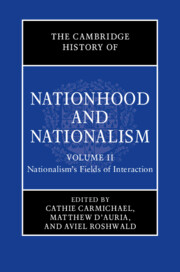Book contents
- The Cambridge History of Nationhood and Nationalism
- The Cambridge History of Nationhood and Nationalism
- The Cambridge History of Nationhood and Nationalism
- Copyright page
- Contents
- Figures
- Tables
- Contributors
- Part I Imperial and Postcolonial Settings
- 1 Building Nation-Empires in the Eighteenth-Century Iberian Atlantic
- 2 Nations and Nationalisms in the Late Ottoman Empire
- 3 The Dutch Empire
- 4 The Habsburg Monarchy
- 5 The British Empire
- 6 The French Empire
- 7 Germany as a “Global Nation,” 1840–1930
- 8 The Russian and Soviet Empire
- 9 The Japanese Empire
- 10 American Internationalism
- 11 The Indian Subcontinent: From Raj to Partition
- 12 Middle Eastern and North African Nationalisms
- 13 African Nationalisms
- 14 Bringing Empires Back in: The Imperial Origins of Nations in Indochina
- Conclusion to Part I
- Part II Transnational and Religious Missions and Identities
- Part III Intersections: National(ist) Synergies and Tensions with Other Social, Economic, Political, and Cultural Categories, Identities, and Practices
- Index
- References
13 - African Nationalisms
from Part I - Imperial and Postcolonial Settings
Published online by Cambridge University Press: 08 November 2023
- The Cambridge History of Nationhood and Nationalism
- The Cambridge History of Nationhood and Nationalism
- The Cambridge History of Nationhood and Nationalism
- Copyright page
- Contents
- Figures
- Tables
- Contributors
- Part I Imperial and Postcolonial Settings
- 1 Building Nation-Empires in the Eighteenth-Century Iberian Atlantic
- 2 Nations and Nationalisms in the Late Ottoman Empire
- 3 The Dutch Empire
- 4 The Habsburg Monarchy
- 5 The British Empire
- 6 The French Empire
- 7 Germany as a “Global Nation,” 1840–1930
- 8 The Russian and Soviet Empire
- 9 The Japanese Empire
- 10 American Internationalism
- 11 The Indian Subcontinent: From Raj to Partition
- 12 Middle Eastern and North African Nationalisms
- 13 African Nationalisms
- 14 Bringing Empires Back in: The Imperial Origins of Nations in Indochina
- Conclusion to Part I
- Part II Transnational and Religious Missions and Identities
- Part III Intersections: National(ist) Synergies and Tensions with Other Social, Economic, Political, and Cultural Categories, Identities, and Practices
- Index
- References
Summary
In the early twenty-first century, nations across Africa celebrated their fiftieth birthdays. The symbols employed to mark the occasion and the memories evoked bore witness to the joys as well as the trials and tribulations of a fifty-year history. For many, fifty years of independent nationhood was an occasion for celebration.1 But at the same time, the history of nationalism and nationhood is not purely a celebratory story. The politics of the early twenty-first century, in African countries as elsewhere in the world, served as a reminder that modern nationalism also has a dark side, and that violence and dispossession can follow when dynamics of inclusion and exclusion are drawn along national lines.
- Type
- Chapter
- Information
- The Cambridge History of Nationhood and Nationalism , pp. 280 - 299Publisher: Cambridge University PressPrint publication year: 2023



